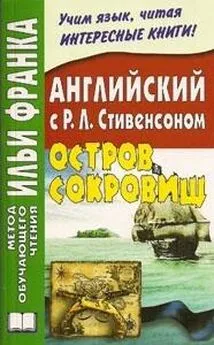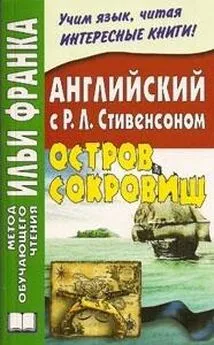Илья Франк - Английский язык с Р.Л. Стивенсоном. Остров сокровищ
- Название:Английский язык с Р.Л. Стивенсоном. Остров сокровищ
- Автор:
- Жанр:
- Издательство:неизвестно
- Год:неизвестен
- ISBN:нет данных
- Рейтинг:
- Избранное:Добавить в избранное
-
Отзывы:
-
Ваша оценка:
Илья Франк - Английский язык с Р.Л. Стивенсоном. Остров сокровищ краткое содержание
Английский язык с Р.Л. Стивенсоном. Остров сокровищ - читать онлайн бесплатно ознакомительный отрывок
Интервал:
Закладка:
прозорливый ).
4. 'Why (ну да!),' I cried, 'the squire's a gentleman (сквайр — /настоящий/
джентльмен). And, besides, if we got rid of the others (и, кроме того, если бы
мы избавились от остальных = от пиратов), we should want you to help work
the vessel home (мы бы нуждались в вас = вы нам поможете довести судно до
дома; to work — работать, управлять, направлять движение ).'
livery [`lIvqrI] shrewdness [`SrHdnIs] vessel [`vesl]
1. 'Ay, but you see,' returned Ben Gunn, 'I didn't mean giving me a gate to
keep, and a suit of livery clothes, and such; that's not my mark, Jim. What I
mean is, would he be likely to come down to the toon of, say one thousand
pounds out of money that's as good as a man's own already?'
2. 'I am sure he would,' said I. 'As it was, all hands were to share.'
3. ' And a passage home?' he added, with a look of great shrewdness.
4. 'Why,' I cried, 'the squire's a gentleman. And, besides, if we got rid of the
others, we should want you to help work the vessel home.'
Мультиязыковой проект Ильи Франка www.franklang.ru
333
1. 'Ah,' said he, 'so you would (значит, вы /и вправду/ возьмете меня).' And he
seemed very much relieved (и он, казалось, весьма успокоился; to relieve —
облегчить, успокоить ).
2. 'Now, I'll tell you what (а теперь вот что я тебе скажу),' he went on
(продолжал он). 'So much I'll tell you, and no more (вот что я расскажу тебе, и
больше ничего). I were in Flint's ship when he buried the treasure (я был на
корабле Флинта, когда он зарыл сокровища); he and six along-six strong
seamen (он и шесть здоровенных: «около шести /футов роста/» моряков).
They were ashore nigh on a week (они были на берегу почти с неделю), and us
standing off and on in the old Walrus (а мы дрейфовали у берега на старом
Морже ; to stand off — держаться на расстоянии; to stand off and on —
ходить переменным курсом от берега к берегу ). One fine day up went the
signal (в один прекрасный день раздался сигнал = выстрел; to go up —
подниматься, раздаваться ), and here come Flint by himself in a little boat (и
приплыл Флинт один, в маленькой лодке), and his head done up in a blue scarf
(а его голова повязана синим платком). The sun was getting up (солнце
всходило), and mortal white he looked about the cut-water (и мертвенно
бледным он выглядел, /стоя/ на водорезе). But, there he was, you mind, and the
six all dead (но он там был /один/, заметь, а все шестеро — мертвы) — dead
and buried (мертвы: «убиты и похоронены»). How he done it, not a man aboard
us could make out (как он это сделал, никто из нас на борту не мог понять). It
was battle, murder, and sudden death (/была ли там/ драка, убийство, или
внезапная смерть), leastways — him — ainst six (по крайней мере, он — /один/
против шестерых; ainst = against ). Billy Bones was the mate (Билли Бонс был
помощником капитана); Long John, he was quartermaster (Долговязый Джон
был квартирмейстером) and they asked him where the treasure was (и они
спросили его, где сокровища). "Ah,'' say he, "you can go ashore, if you like, and
stay (вы можете ступать на берег, если хотите, и остаться),'' he says "but as for
the ship, she'll beat up for more, by thunder (но что до корабля, то он пойдет
Мультиязыковой проект Ильи Франка www.franklang.ru
334
против ветра за бульшим = не станет вас ждать, /клянусь/ громом; to beat up
— /мор./ продвигаться против ветра, против течения )!'' That's what he said
(вот что он сказал).
walrus [`wLlrqs] scarf [skRf] treasure [`treZq] thunder [`TAndq]
1. 'Ah,' said he, 'so you would.' And he seemed very much relieved.
2. 'Now, I'll tell you what,' he went on. 'So much I'll tell you, and no more. I
were in Flint's ship when he buried the treasure; he and six along-six strong
seamen. They were ashore nigh on a week, and us standing off and on in the
old Walrus . One fine day up went the signal, and here come Flint by himself in
a little boat, and his head done up in a blue scarf. The sun was getting up, and
mortal white he looked about the cut-water. But, there he was, you mind, and
the six all dead — dead and buried. How he done it, not a man aboard us
could make out. It was battle, murder, and sudden death, leastways — him —
ainst six. Billy Bones was the mate; Long John, he was quartermaster and
they asked him where the treasure was. "Ah,'' say he, "you can go ashore, if
you like, and stay,'' he says "but as for the ship, she'll beat up for more, by
thunder!'' That's what he said.
1. 'Well, I was in another ship three years back (я был на другом корабле три
года назад), and we sighted this island (и мы увидели этот остров). "Boys
(ребята),'' said I, "here's Flint's treasure let's land and find it (здесь /зарыты/
сокровища Флинта, давайте высадимся и отыщем их).'' The cap'n was
displeased at that (капитан был недоволен тем /предложением/); but my
messmates were all of a mind, and landed (но все матросы были одного желания
Мультиязыковой проект Ильи Франка www.franklang.ru
335
= со мной заодно, и /мы/ высадились; messmate — товарищ по кают-
компании ). Twelve days they looked for it (двенадцать дней мы искали их), and
every day they had the worse word for me (и с каждым днем они имели слово
все хуже для меня = ругали меня все сильней), until one fine morning all hands
went aboard (пока в одно прекрасное утро все матросы не поднялись на борт).
"As for you, Benjamin Gunn (а ты, Бенджамин Ганн),'' says they, ''here's a
musket (вот мушкет),'' they says, "and a spade, and pick-axe (лопата и топор).
You can stay here, and find Flint's money for yourself (ты можешь оставаться
здесь и найти деньги Флинта сам),'' they says.
2. 'Well, Jim, three years have I been here (и вот, Джим, три года я здесь), and
not a bite of Christian diet from that day to this (и ни куска человеческой пищи с
того дня до этого). But now, you look here (но теперь, послушай); look at me
(посмотри на меня). Do I look like a man before the mast (/разве/ я похож на
матроса)? No, says you (нет, говоришь). Nor I weren't, neither, I says (да я и не
был /никогда/, скажу).' And with that he winked and pinched me hard (и с этими
/словами/ он подмигнул и ущипнул меня сильно).
sighted [`saItId] musket [`mAskIt] spade [`speId] Christian [`krIstSqn]
1. 'Well, I was in another ship three years back, and we sighted this island.
"Boys,'' said I, "here's Flint's treasure let's land and find it.'' The cap'n was
displeased at that; but my messmates were all of a mind, and landed. Twelve
days they looked for it, and every day they had the worse word for me, until
one fine morning all hands went aboard. "As for you, Benjamin Gunn,'' says
they, ''here's a musket,'' they says, "and a spade, and pick-axe. You can stay
here, and find Flint's money for yourself,'' they says.
Мультиязыковой проект Ильи Франка www.franklang.ru
336
2. 'Well, Jim, three years have I been here, and not a bite of Christian diet
from that day to this. But now, you look here; look at me. Do I look like a man
before the mast? No, says you. Nor I weren't, neither, I says.' And with that he
winked and pinched me hard.
1. 'Just you mention them words to your squire, Jim (только ты упомяни = так и
скажи своему сквайру, Джим)' — he went on (продолжал он): 'Nor he weren't,
neither — that's the words (он не был /похож на матроса/ — вот эти слова).
Three years he were the man of this island (три года он был человеком этого
острова = жил тут), light and dark (в свет и темноту = день и ночь), fair and
rain (в ясную /погоду/ и в дождь); and sometimes he would, maybe, think upon a
prayer (says you) (и иногда, может быть, думал о молитве — так и скажи), and
sometimes he would, maybe, think of his old mother (иногда, может быть, думал
о своей престарелой матери), so be as she's alive (you'll say) (дай Бог, чтобы
она была /еще/ жива — это скажешь); but the most part of Gunn's time (this is
what you'll say) (но большую часть его, Ганна, времени — вот что скажи) —
the most part of his time was took up with another matter (большую часть его
времени была занята другим делом). And then you'll give him a nip, like I do (а
потом ты его ущипни, как делаю я).'
Читать дальшеИнтервал:
Закладка:


